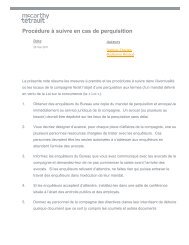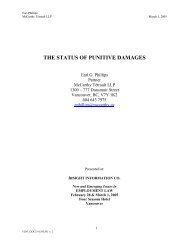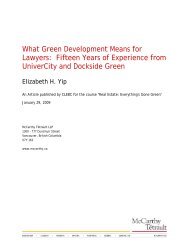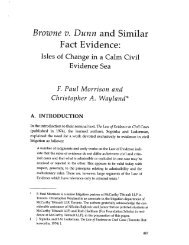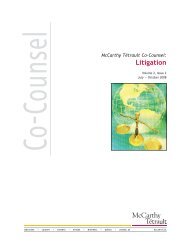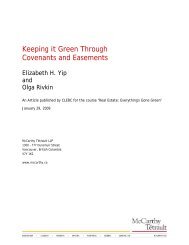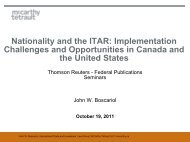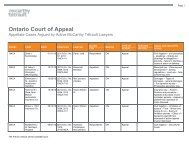The Doctrine of Public Policy in Canadian Contract Law
The Doctrine of Public Policy in Canadian Contract Law
The Doctrine of Public Policy in Canadian Contract Law
Create successful ePaper yourself
Turn your PDF publications into a flip-book with our unique Google optimized e-Paper software.
38 I Annual Review <strong>of</strong> Civil Litigation<br />
is overly dependent upon judicial discretion'"9 and tends to erode the dist<strong>in</strong>ction<br />
between the legislature and the courts.'' This theory would characterize public<br />
policy as little more than a body <strong>of</strong> antiquarian rules whose application should<br />
he reserved for the most clearly pre-determ<strong>in</strong>ed <strong>of</strong> occasions. One author describes<br />
its th<strong>in</strong>k<strong>in</strong>g as follows:<br />
(*bile policy it may be said is a part <strong>of</strong> the common law like any other topic,<br />
such as the law <strong>of</strong> tort, and is to be developed by the systematic extension <strong>of</strong><br />
b<strong>in</strong>d<strong>in</strong>g precedents accord<strong>in</strong>g to the ord<strong>in</strong>ary common law pattern... <strong>The</strong> applicable<br />
rule <strong>of</strong> public policy or morality can then only be found <strong>in</strong> the body <strong>of</strong> law<br />
itself so far as previous reported decisions (or statutes) may afford a precedent or<br />
a guide.20'<br />
Such a concept is popular with those who believe that the courts have no<br />
authority to create a new head <strong>of</strong> public policy.202 Accord<strong>in</strong>g to this view, the<br />
199 This criticism is constantly repeated <strong>in</strong> the courts and the literature. One <strong>of</strong> its most<br />
forceful expositions is found <strong>in</strong> the statement <strong>of</strong> Lord Wright <strong>in</strong> Fender, supra note 46<br />
at 40-41 that ". _it has been at least suggested, if not overtly argued, that a judge has<br />
peculiar powers <strong>in</strong> a question <strong>of</strong> public policy <strong>in</strong> act<strong>in</strong>g upon his <strong>in</strong>dividual views or<br />
predilection and can on these grounds refuse to enforce a contract or disposition <strong>of</strong><br />
property ex facie valid. That was the view expressed. .. by Pollock C.B. <strong>in</strong> the same<br />
case <strong>of</strong> Egerton v. Earl <strong>of</strong> Brownlow. He said: 'It may be that judges are no better able<br />
to discern what is for the public good than other experienced and enlightened members<br />
<strong>of</strong> the community; but that is no reason for their refus<strong>in</strong>g to enterta<strong>in</strong> the question and<br />
decl<strong>in</strong><strong>in</strong>g to decide upon it.' While it is true that a judge is entitled to have and even<br />
state on proper occasions his personal op<strong>in</strong>ions on questions <strong>of</strong> public <strong>in</strong>terest, it is a<br />
different matter if he claims to base his judicial decisions on his personal op<strong>in</strong>ions." See<br />
also Pr<strong>in</strong>ce, supra note 128 at 165-66.<br />
200 <strong>The</strong> locus classicus <strong>of</strong> this criticism is the judgment <strong>of</strong> Parke B. <strong>in</strong> Egerton, cited above<br />
at note 41. See also Buckley, supra note 8 at para. 6.01, referr<strong>in</strong>g to this as the "most<br />
fundamental" issue that arises <strong>in</strong> connection with the legitimacy <strong>of</strong> the doctr<strong>in</strong>e. An<br />
<strong>in</strong>terest<strong>in</strong>g element <strong>of</strong> this criticism is the charge that courts, unlike the legislature, lack<br />
the empirical resources which are necessary to identify a given head <strong>of</strong> public policy.<br />
This criticism is developed <strong>in</strong> Walter Gellhorn, "<strong>Contract</strong>s and <strong>Public</strong> <strong>Policy</strong>" (1935) 35<br />
Colum. L. Rev. 679 at 695, where the author states that "[i]f 'public policy' should be<br />
def<strong>in</strong>ed as someth<strong>in</strong>g hav<strong>in</strong>g no relationship to the judgments formulated by Constitutions,<br />
statutes, and prior judicial and non judicial <strong>in</strong>vestigations, but as be<strong>in</strong>g ascerta<strong>in</strong>able<br />
only by an unassisted judicial discovery <strong>of</strong> 'what is naturally and <strong>in</strong>herently just<br />
and right between man and man,' there would be much to be said <strong>in</strong> favour <strong>of</strong> the<br />
criticism. But if a determ<strong>in</strong>ation <strong>of</strong> the relevant public policy rests upon authoritative<br />
legislative pronouncement and upon <strong>in</strong>telligent effort to procure <strong>in</strong>formative data, the<br />
criticism loses force."<br />
201 Lloyd, supra note 11 at 121-22. Among the theory's adherents is Fridman, supra note 5<br />
at 363-364.<br />
202 See the judgment <strong>of</strong> Lord Halsbury <strong>in</strong> Janson, supra note 12 at 491-492, stat<strong>in</strong>g that "I<br />
deny that any court can <strong>in</strong>vent a new head <strong>of</strong> public policy. A contract for marriage<br />
brokerage, the creation <strong>of</strong> a perpetuity, a contract <strong>in</strong> restra<strong>in</strong>t <strong>of</strong> trade, a gam<strong>in</strong>g or<br />
wager<strong>in</strong>g contract, or, what is relevant here, the assist<strong>in</strong>g <strong>of</strong> the K<strong>in</strong>g's enemies, all are<br />
undoubtedly unlawful th<strong>in</strong>gs, and you may say that it is because they are contrary to



